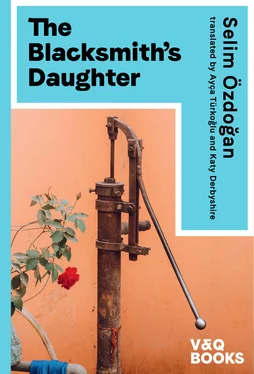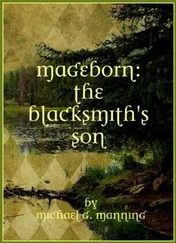Recep, the only blond boy in the village, was in the fourth year and infamous for playing tricks and making trouble. One day he flicked balls of paper across the classroom. When the teacher caught him at it, he smacked him so hard in the face that his cheeks were still red the next morning. But just two days later he started flicking again and hit the teacher on the back of the neck.
Without turning around, the teacher said: ‘Recep.’
‘It was me,’ Gül said; she had no idea why it slipped out. Recep wasn’t even her friend. He was the son of a good friend of her mother’s, and people thought the reason he was naughty was that he didn’t have a father; the man had gone to Istanbul one day and never come back, or so they said.
The teacher turned around and looked at Gül for a few seconds. He knew it hadn’t been her, but he called her to the front and made her stretch out her left hand, palm upwards. He had to maintain his authority. Everyone held their breath, and the slapping sound was almost worse for Gül than the pain. As she sat back down, she knew her mother would hear about it. She’d be angry with her for being naughty, she knew she would. Tears pricked her eyes.
‘It doesn’t hurt any more, does it?’ Recep asked after school.
‘No,’ Gül murmured, looking briefly up into his blue-grey eyes.
‘Here.’
Recep took a few apricot stones out of his pocket and pressed them into Gül’s hand.
‘See you tomorrow,’ he added, and then he turned away and left.
At home, Gül smashed the apricot pits open with a stone and ate the nutty innards, not asking Melike if she wanted any.
Gül didn’t cry the second time she got hit with the ruler. No one was allowed to be late, not even the girls. And if you came late on Monday mornings, when they were singing the national anthem, you’d get a whack with the ruler. On other days, you had a chance of getting away with it.
When Melike had a bad dream or woke up and couldn’t get back to sleep, she’d get into bed with Gül, snuggle up and fall asleep again. At night, half asleep, Gül liked to feel her sister’s body curled up next to her.
Sometimes, though, Melike would wake up because she’d wet the bed. She’d soon be four but she still wet the bed regularly. The covers were clammy, the mattress was damp and cold and stank, and Melike would get up and simply lie back down in Gül’s warmth.
The night before Gül got her second punishment, Melike woke up from a bad dream and got into Gül’s bed. By the morning, however, she was back in her own. And when Gül awoke from the sounds in the kitchen, she thought she had wet her own bed. Her pyjama bottoms were wet, her legs were damp, the cold spot on the mattress was right underneath her.
Gül undressed and thought about where to hide her pyjamas. She wanted to dry them in secret; she was a big girl, she went to school now, she didn’t wet the bed any more. At first, she stuffed the trousers under Melike’s bedding, and when it was time to go to school, she took them with her to hide them in the stable.
But when she opened the stable door and heard the mice squeaking, sensing rather than seeing their scurrying in the hay, she didn’t dare go in, into the dark stable where the cows and horses and the donkey were too. The stable at the summer house had seemed less scary.
Gül stood at the door in her school uniform. She had already smuggled her pyjama trousers out of the house, and she couldn’t take them to school. And she couldn’t hide them anywhere else, because someone might steal them. It took a long time, a very long time, for Gül to gather up the courage to dash into the stable and hide the trousers in the hay. It took about as long as the national anthem.
A few weeks later, or – more precisely – on the day when their mother told Gül and Melike they would soon be getting a new sibling, Recep was late to school. You could have sung the national anthem 50 times before he arrived. The school day was almost done. It would’ve been smarter of him not to turn up at all. If you didn’t turn up, you wouldn’t get caned. The day after, you could always say you’d had to help your parents.
But Recep knocked, opened the door, presented himself to the teacher and simply held his hands out in front of him. And the teacher didn’t take much convincing.
Afterwards, Recep squeezed himself onto the bench where Gül was sitting and whispered to her: ‘Your dad’s got into a row with Tufan, there’s going to be a fight in the village square. Your dad’s strong, but Tufan has more men.’
Gül was agitated, she felt hot, she felt like she couldn’t sit still any longer, but she didn’t move. Her father was going to fight someone.
‘Why have they fallen out?’ she whispered to Recep.
‘I don’t know. Are you coming with me?’
‘Yes,’ Gül said. She had never seen adults fight before.
You could’ve sung the national anthem for a full year before the school day was finally over, that’s how slow time seemed to pass. There was whispering and gossiping; the news spread, and when the teacher declared school over for the day, the pupils streamed out of the classroom faster than ever before and ran, breathless, towards the village square. Everyone wanted to grab a good spot.
‘Come with me, they’ll chase us away from the square,’ Recep said.
They climbed up a ladder onto the roof of one of the houses that had a good view of the village square. Two groups of men were standing below them, a stone’s throw away. Gül instantly recognised her father in the smaller group. The men were shouting, hurling insults at each other. The blacksmith didn’t have the loudest voice, but he towered over the rest of them and stood with his head high, his shoulders slightly back, his chest pushed out: he didn’t seem afraid at all.
The men picked up stones off the ground and flung them at their rivals; first someone from Tufan’s group would throw one and the others would retreat, then Timur’s men would throw and Tufan’s friends would put their arms in front of their faces to protect themselves and take a few steps back. One of Timur’s mates was hit on the brow, and the left side of his face and his neck were covered with blood, but he shouted the loudest of all. On the other side, even No-Nose Abdul squawked out a few swears. Nearly all the children were afraid of him; his nose had been shot off by his brother when the two of them were young. They’d been playing with their father’s gun, thinking it wasn’t loaded. Abdul only very rarely left the village, so as not to be at the mercy of strangers’ stares. In the village, at least the adults had long grown accustomed to his scarred face, the bridge of his nose ending abruptly just beneath his eyebrows.
‘Dishonourable dog!’ Abdul shouted, and from behind him Tufan yelled: ‘Crook, dirty pig!’
Timur split off from his group and made towards the others. He was lucky, a couple of stones missed him, one clipped his shoulder. When he was standing a good ten strides away from his group, the others stopped throwing stones.
‘What’s your problem, Tufan, you son of an ox? If you’re a man, come over here and fight like one. Don’t just throw stones like a woman.’
‘In case you didn’t already know: in this village, we throw stones to chase off dogs,’ Tufan yelled back. ‘And what are you but a pesky little dog? What business do you have in our village?’
‘A good dog doesn’t bite people in his own village,’ Timur said. ‘Now come and fight like a man.’
Gül would have liked to shout out loud – she would have liked to do something to make them all get along again, but she sat on the roof and held her breath like all the other children who had gathered up there in the meantime, having been chased away from the village square. A few of the children recognised their own fathers among the groups. Recep wished he had a father who could be standing there too, or at least a brother old enough, but he just had four older sisters and a mother. Tufan took a few steps forward, not as energetically as Timur had, then turned around to look at his men. Now there were perhaps 15 strides between Timur and Tufan. The first upright and proud, the other a little shorter, his shoulders sunken.
Читать дальше












